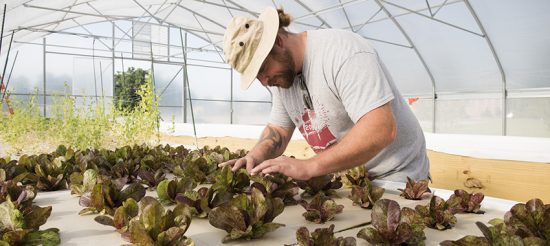Georgia Southern University researchers making waves in sustainable farming

Could aquaponics be the farming of the future? Researchers at the Georgia Southern University FORAM Sustainable Aquaponics Research Center (SARC) on the Armstrong Campus in Savannah are discovering how feasible that may be.
In just two years of operation, SARC has offered undergraduate students, faculty and volunteers the opportunity to conduct fundamental, interdisciplinary research in the area of aquaponics, or soilless farming. With a mission to conduct cutting-edge research and develop technologies and best practices to improve the sustainability and profitability of soilless farming techniques, the SARC is truly making waves in south Georgia.
SARC is funded by a three-phase grant from the FORAM Foundation. Researchers are currently in the first phase, which supports the scientific study of determining what can be done to address the economic sustainability of aquaponic facilities.
Aquaponics is the unique study that mixes aquaculture, the study of fish, and hydroponics, the growth of plants in water. SARC has four independent recirculating systems, each containing 900-gallon tanks capable of holding more than 100 mature tilapia.
When the fish excrete waste, ammonia is released into the water. This chemical is toxic to the water’s inhabitants. The recirculating systems at SARC allow the plants to absorb this ammonia so the tilapia may thrive in water that doesn’t need to be changed. The nutrient-rich water allows the plants to grow in completely soilless areas, thus creating a closed system to grow vegetables and herbs.
The next phase will involve starting a pilot commercial aquaponics facility based on that research and lessons learned in that phase. This will allow FORAM and SARC to test the economic viability of aquaponics in the Savannah area.
The third stage would put the profitable aquaponics business to good use, developing a self-contained, fully operational system to send with nonprofits to third-world countries and urban cities so those inhabitants may also enjoy the benefits of soilless farming.
Associate Dean of Outreach, Planning and Community Programs for the College of Science and Mathematics and Director of the FORAM Sustainable Aquaponics Research Center Brent Feske, Ph.D., says if researchers can determine how to make aquaponics more affordable and sustainable, the science could help end hunger in urban cities and third-world countries.
“We still have a ways to go, but I really believe this work will make a difference,” said Feske. “People get excited about wanting to help others, and these systems could make a difference on a global scale.”
There are many ways to support the efforts of SARC. Members of the Georgia Southern community may join a Google Group through MyGeorgiaSouthern to purchase the fresh, homegrown produce from SARC and enjoy everything from chives and green onions to chili peppers and fresh lettuce. All proceeds go directly back into the facility, helping to cover the necessary costs of the electricity, heating and cooling systems and other elements needed to keep SARC running.
Researchers at SARC are also looking for ways to reduce the cost of those elements, working daily to discover new methods of lowering the energy costs of cooling the water in the summer and heating it in the winter, moving and aerating the water, redesigning the facility to maximize efficiency and designing a self-contained system to fit in a shipping container.
Currently, researchers at SARC are working with Cherax Farms to integrate Giant Australian Red-Claw Crayfish into the aquaculture component in addition to the tilapia. SARC is also in the process of teaming up with Nine Line Foundation to provide self-sustaining aquaponics centers for a temporary housing project for United States veterans in the area. Collaborations with local schools and businesses are also in the works.
To learn more about SARC and how you can become a volunteer or donor, visit https://www.facebook.com/FORAMSARC/ or http://cosm.georgiasouthern.edu/sarc/.
Georgia Southern University, a public Carnegie Doctoral/Research institution founded in 1906, offers 141 degree programs serving more than 27,000 students through nine colleges on three campuses in Statesboro, Savannah, Hinesville and online instruction. A leader in higher education in southeast Georgia, the University provides a diverse student population with expert faculty, world-class scholarship and hands-on learning opportunities. Georgia Southern creates lifelong learners who serve as responsible scholars, leaders and stewards in their communities. Visit GeorgiaSouthern.edu.
Posted in Press Releases

